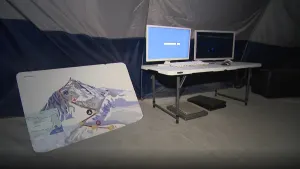More Stories
Federal officials are extending the requirement for masks on planes and public transportation for one more month - through mid-April - while taking steps that could lead to lifting the rule.
The mask mandate was scheduled to expire March 18, but the Transportation Security Administration said Thursday that it will extend the requirement through April 18.
TSA said the extra month will give the U.S. Centers for Disease Control and Prevention time to develop new, more targeted policies that will consider the number of cases of COVID-19 nationally and in local communities, and the risk of new variants.
The TSA enforces the mask rule, which extends to planes, buses, trains and transit hubs.
As of March 3, more than 90% of the U.S. population lived in areas with low or medium COVID-19 case levels, meaning that the CDC no longer recommends face masks in public indoor settings.
A decision to eventually scrap the mask requirement - one of the last vestiges of nationwide pandemic rules - has grown more likely in recent weeks as more states, even those led by Democratic governors, relaxed their own mandates for wearing masks indoors, and the CDC eased its recommendations.
That led critics to question why the CDC would allow maskless people to gather in movie theaters and sports arenas but not on planes.
White House press secretary Jen Psaki said Thursday that deciding on the right policy for travel was more complicated than setting standards for local communities to follow.
“If you're moving from one zone to another and picking people up ... it's a little bit different, and that requires some consultation, which is what (CDC officials) are going to endeavor to do between now and April 18,” Psaki said.
CDC Director Dr. Rochelle Walensky said last week that her agency must study the science around virus transmission “but also the epidemiology and the frequency that we may encounter a variant of concern or a variant of interest in our travel corridors.”
The federal mask mandate was imposed in January 2021, days after President Joe Biden took office, and has been extended several times. The Trump administration had declined to require masks on public transportation, but airlines began requiring them in mid-2020 to reassure passengers worried about contracting the virus.
The requirement became a lightning rod for confrontation between some passengers and airline crews. Since the start of 2021, airlines have reported more than 6,000 incidents of unruly passengers, most of them involving disputes over mask wearing. That history could make it unlikely for airlines to require masks once the federal rule lapses.
“I don't think the airlines have any desire to impose their own requirements at this point against a public that is weary of these restrictions,” said Henry Harteveldt, a travel-industry analyst with Atmosphere Research Group.
On four flights he took this week, Harteveldt said, “I noticed there were passengers who did not wear their masks even when they were not eating or drinking, and the flight attendants did not ask them to put them on.”
In September, the Transportation Security Administration doubled the fines for people who refused to wear masks on public transportation to $500 to $1,000 for first-time offenders and up to $3,000 for repeat violations.
News of the extension and policy review was first reported by Reuters.
TSA provided the following statement to News 12: "At CDC’s recommendation, TSA will extend the security directive for mask use on public transportation and transportation hubs for one month, through April 18th. During that time, CDC will work with government agencies to help inform a revised policy framework for when, and under what circumstances, masks should be required in the public transportation corridor. This revised framework will be based on the COVID-19 community levels, risk of new variants, national data, and the latest science. We will communicate any updates publicly if and/or when they change."
More from News 12
1:31

What's Cooking: Uncle Giuseppe's Marketplace's prime rib roast
1:30

Looking for a road trip? Check out Big Snow at American Dream in East Rutherford
1:27

What's Cooking: Uncle Giuseppe's quiche lorraine
2:34

Guide: Safety tips to help prevent home burglaries
2:19

Guide: Safety measures to help prevent fires and how to escape one
2:36
